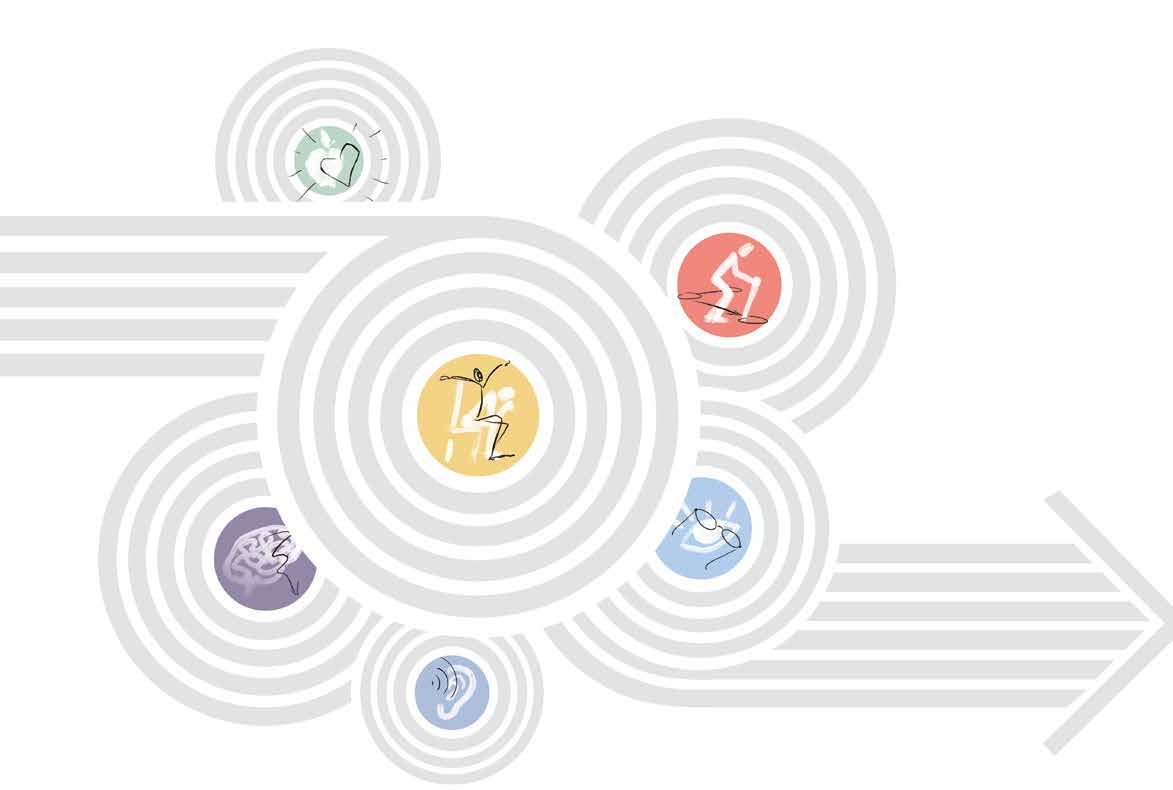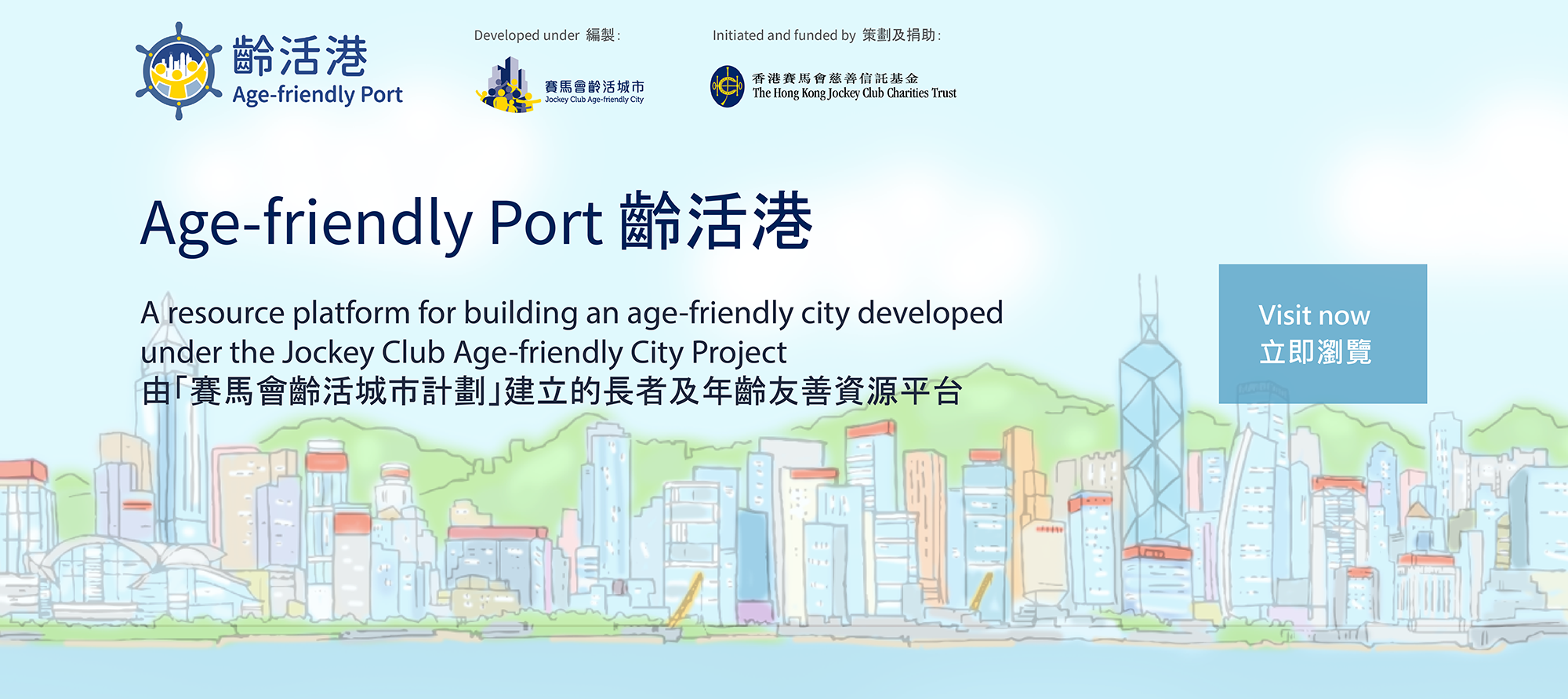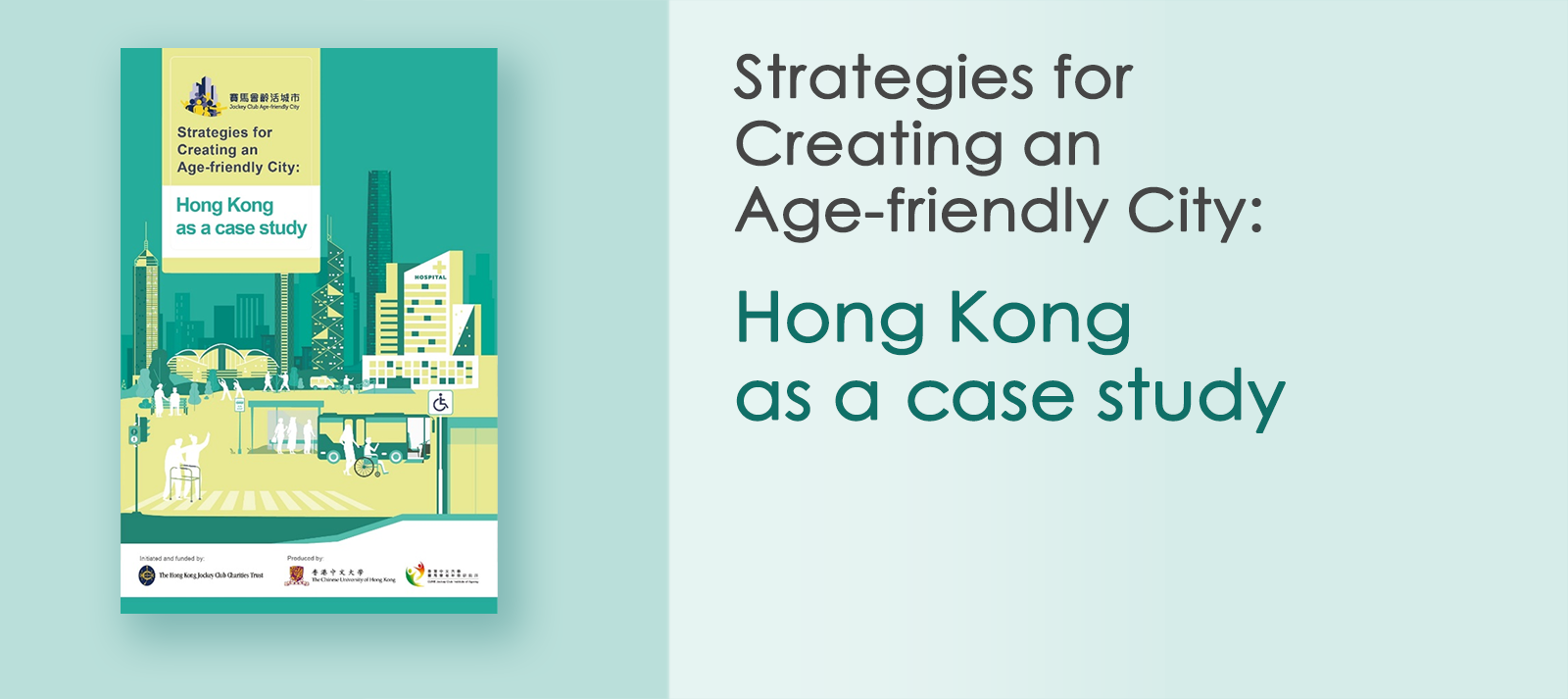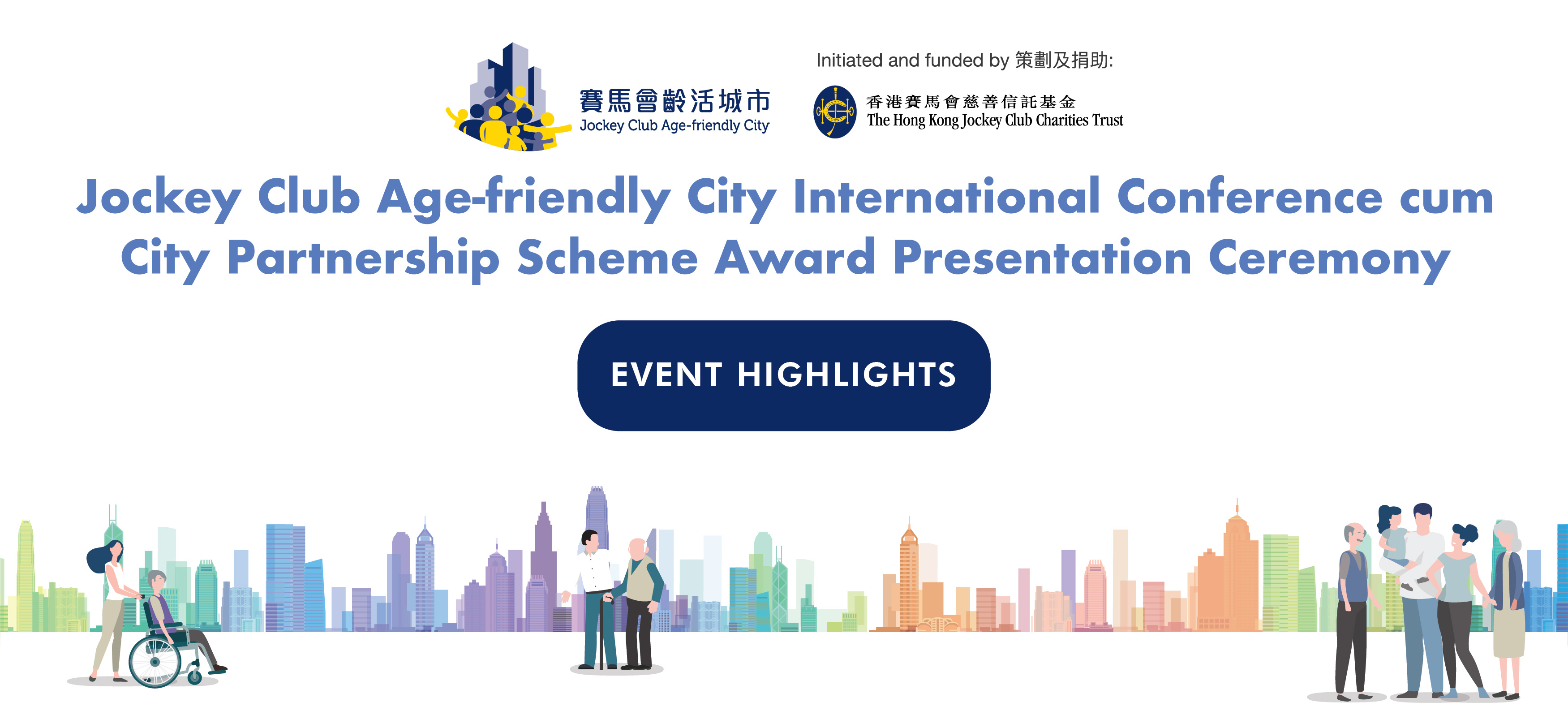HOME
JC Age-friendly City Project - p3_qol_index
Age-friendly Community and the Decade of Healthy Ageing
Hong Kong Elder Quality of Life Index (HKEQOL)
Introduction
To prepare for the continued ageing of the population in Hong Kong, there is a pressing need to assess the well-being of local older people to assist in formulating effective policies to address this socio-demographic change in Hong Kong. The Chinese University of Hong Kong Jockey Club Institute of Ageing, in collaboration with the Centre for Quality of Life, with funding support from The Hong Kong Jockey Club Charities Trust, has been developing the Hong Kong Elder Quality of Life Index (HKEQOL), incorporating the AgeWatch Index, to assess the elderly well-being in a comprehensive manner with locally significant indicators annually since 2014 for six consecutive years.
Indicators of the HKEQOL Index
The HKEQOL Index includes tailor-made indicators to Hong Kong in relation to the Age-friendly City concept proposed by the World Health Organization (WHO) and takes reference to the Global AgeWatch Index, using 22 indicators under 4 domains. The features of the new index are:
- Based on the four domains (i.e. income security, health status, capability and enabling environment) in the Global AgeWatch Index to assess major aspects of well-being in older people.
- Indicators are added to expand the coverage of assessment of well-being in older people.
- Indicators are designed according to suggestions in Measuring the Age-friendliness of Cities: A Guide to Using Core Indicators published by the World Health Organization in 2015 in assessing age-friendliness of Hong Kong.

Significance of the HKEQOL Index
The HKEQQL Index enables the trend analysis of the social and economic well-being of older people annually, identification of locally important determinants of well-being among Hong Kong older adults, as well as monitoring and evaluating local age-friendly initiatives.
At the beginning, this Index put a spotlight on domains where Hong Kong lags far behind other countries concerning its ageing population, in terms of income security, as well as psychological health (ranking 79 out of 97), although it ranked first in physical health, by virtue of its longest life expectancy in the world (CUHK Jockey Club Institute of Ageing, 2014). The use of this indicator was compared with other indicators of societal adaptations to ageing well (Woo, 2020b). Cultural adaptation was found to be relevant, particularly between Eastern and Western cultures. Soon after, the WHO promoted a set of indicators specifically for monitoring the age-friendliness of cities, which we incorporated into the constructs for the Age Watch index, to form the new HKEQOL Index (CUHK Jockey Club Institute of Ageing, 2016).
This index was then used to monitor the progress of the territory-wide AFC project. Although positive changes were initially observed, the impact of the 2019 social unrest in Hong Kong, followed by the COVID-19 pandemic, overshadowed these improvements (Woo, Leung, Yu, Lee, & Wong, 2021). The documentation of the trend in HKEQOL shows that while it may be used as a macro indicator that is able to reflect policies affecting the well-being of older people, it is also able to reflect the impact of societal unrest and pandemics, and that the latter may override the effect of existing ageing policies.

Research Reports on Index Results
A total of six Index reports and four topical reports were produced under the research on HKEQOL. The report findings can serve as a useful reference on policy planning of age-friendly interventions for improving the quality of life of elderly people in Hong Kong.
Index reports on HKEQOL
JC Age-friendly City Project - p1b_morenews
Age-friendly Community and the Decade of Healthy Ageing
More News

Poster presentation at the International Association of Gerontology and Geriatrics World Congress 2022

Launch of Age-friendly Port – online resource platform for providing useful resources of all kinds on age-friendly city

International Conference on “Age-friendly Cities 15 Years On: Origins and Best Practices Worldwide and in Hong Kong"

Empirical evidence on the effectiveness of Age-friendly City initiatives on building age-friendly environment

Publication of four Thematic Reports on Age-friendly City Domains

Publication of Age-friendly City Guidebook

Publication of Happy Ageing Booklet – Eight domains of an Age-friendly City (Chinese only)

Better understand the association between social gradient of self-rated health in older people and sense of community

Significance of the Hong Kong Quality of Life Index for measuring the wellbeing of older people

Online videos of Exercises at home for the elderly

Online videos of Healthy diet

Booklet of Healthy ageing – Healthy recipes and information (Chinese version only)
JC Age-friendly City Project - p1_news
Age-friendly Community and the Decade of Healthy Ageing
Featured News

Significance of the Hong Kong Quality of Life Index for measuring the wellbeing of older people
Using a multidimensional index of quality of life (i.e., The Hong Kong Elder Quality of Life Index), our researchers documented the changes in the quality of life of older people in Hong Kong from 2017 - 2020. Improvement in well-being was in tandem with the implementation of age-friendly policies and programs, whereas deterioration was marked during the period of social unrest and pandemic. The index is a timely and valid tool to monitor the well-being of older people, informing policies to maintain well-being of older people. Find out more >
Better understand the association between social gradient of self-rated health in older people and sense of community
Our researchers found a social gradient of poor self-rated health by measures of socioeconomic status including monthly income, educational attainment and financial sufficiency among older people in Hong Kong. There is also evidence supporting a stronger gradient in educational attainment among those with higher sense of community. Find out more >


Empirical evidence on the effectiveness of Age-friendly City initiatives on building age-friendly environment
Our researchers, in collaboration with other researchers from three local universities, evaluated the impact of the AFC initiatives on the perceived friendliness in Hong Kong, using a bottom-up, mixed-method approach. Converging findings from surveys and focus group interviews indicated significant improvements in multiple domains of perceived age-friendliness in Hong Kong. Find out more >
JC Community eHealth Care Project - p0_home_morenews_sub6
JC Community eHealth Care Project
Better understand the readiness for implementing
the WHO ICOPE Approach

Our researchers found that the stage of ICOPE implementation readiness was “initiating”. The social care settings were able to provide a context to engage older adults, education on general health and disease prevention, and interventions for promoting healthy ageing. The study also identified barriers and facilitators to ICOPE implementation.
Abstract
Although integrated care has been considered a key strategy in reforming health systems around the world, it seems hard to realise in practice, particularly in the part of medical social integration. Worse still, little is known about the capacity of social care professionals who implement it, or their perceived roles and responsibilities, as well as the barriers and facilitators that stakeholders from the health and social sectors identify as factors affecting the ICOPE implementation process. Therefore, the present study was performed to probe into these issues. Data were collected from an online survey based on the WHO ICOPE scorecard (N = 34), and focus groups with policy makers, managers, health and social care professionals (N = 47). Inductive analyses were performed in accordance with the service and system levels within the WHO ICOPE implementation framework. While the findings from the scorecard survey highlight the gap in actualizing the ICOPE approach within the existing social services and care structures, we found support for a model of integrated care underpinned by the WHO ICOPE approach. Factors that may hinder and facilitate ICOPE implementation include workforce capacity-building, coordinated networks and partnerships, and financial mechanisms. This finding can help inform subsequent actions that further support health and social care advancement and collaboration, and the implementation of the ICOPE approach.
The paper Assessing the Readiness for Implementing the World Health Organization’s ICOPE Approach in Hong Kong: Perspectives from Social Care and Policy Stakeholders can be read in full on the The Journal of Frailty & Aging journal website.




















